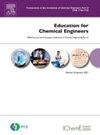Application of AI teaching assistant to college education of principles of chemical engineering
IF 2.3
2区 教育学
Q1 EDUCATION, SCIENTIFIC DISCIPLINES
引用次数: 0
Abstract
With the development of large language models(LLM) in Artificial Intelligence(AI), AI assistants have been widely applied across various sectors and lead to tremendous enhancing in the work efficiency. However, there is hardly any comprehensive studies on the application of AI assistants to the teaching and evaluation process of Principles of Chemical Engineering course for college education. Therefore, this paper integrates and optimizes the teaching and evaluation processes of Principles of Chemical Engineering course with the assistance of AI technology. By leveraging AI technology for instructional support, the course content is integrating with real-life scenarios and cutting-edge scientific research. In the meanwhile, students' systematic thinking, innovative and entrepreneurial skills as well as the critical thinking can get fostered. Moreover, integration of knowledge across disciplines, majors, and even virtual-real scenarios can get accelerated and expanded with the AI assistant. During the reform, the following modulus, including interactive conversation led by guide words, optional module expansion for practical applications, error-spotting games for figures and literatures, curriculum design and composition of business plans are facilitated by the AI assistant to improve the interest, breadth and depth of the curriculum contents. The implementation of this case effectively advances the reform of college education in the boosting backdrop of AI, equipping students with thoughts and abilities to apply the latest AI technologies to their study and research projects. The implementation of the case has been proven to be practically feasible, and shows great potentials for further applications.
人工智能助教在高校化学工程原理教学中的应用
随着人工智能领域大语言模型(LLM)的发展,人工智能助手在各个领域得到了广泛的应用,极大地提高了工作效率。然而,关于人工智能助手在高校化学工程原理课程教学与评价过程中的应用,目前还没有全面的研究。因此,本文借助人工智能技术对《化学工程原理》课程的教学与评价流程进行整合与优化。通过利用人工智能技术进行教学支持,课程内容与现实场景和前沿科学研究相结合。同时培养学生的系统思维、创新创业能力和批判性思维。此外,通过人工智能助手,跨学科、专业甚至虚拟现实场景的知识整合可以得到加速和扩展。在改革过程中,AI助手辅助完成了引导语引导的互动对话、实际应用的可选模块拓展、人物和文献的猜错游戏、课程设计、商业计划书的撰写等模块,提高了课程内容的趣味性、广度和深度。本案例的实施有效地推进了人工智能助推背景下的高校教育改革,使学生具备将最新的人工智能技术应用于学习和研究项目的思想和能力。实践证明,该案例的实施是切实可行的,具有广阔的应用前景。
本文章由计算机程序翻译,如有差异,请以英文原文为准。
求助全文
约1分钟内获得全文
求助全文
来源期刊

Education for Chemical Engineers
Multiple-
CiteScore
8.80
自引率
17.90%
发文量
30
审稿时长
31 days
期刊介绍:
Education for Chemical Engineers was launched in 2006 with a remit to publisheducation research papers, resource reviews and teaching and learning notes. ECE is targeted at chemical engineering academics and educators, discussing the ongoingchanges and development in chemical engineering education. This international title publishes papers from around the world, creating a global network of chemical engineering academics. Papers demonstrating how educational research results can be applied to chemical engineering education are particularly welcome, as are the accounts of research work that brings new perspectives to established principles, highlighting unsolved problems or indicating direction for future research relevant to chemical engineering education. Core topic areas: -Assessment- Accreditation- Curriculum development and transformation- Design- Diversity- Distance education-- E-learning Entrepreneurship programs- Industry-academic linkages- Benchmarking- Lifelong learning- Multidisciplinary programs- Outreach from kindergarten to high school programs- Student recruitment and retention and transition programs- New technology- Problem-based learning- Social responsibility and professionalism- Teamwork- Web-based learning
 求助内容:
求助内容: 应助结果提醒方式:
应助结果提醒方式:


